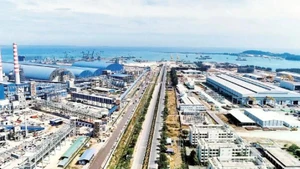While some enterprises in Vietnam adhere strictly to emission regulations, there have been instances of inaccurate processes involving environmental certifications and green growth credentials. Regulatory bodies must develop robust systems, mechanisms, and policies to enforce clear rewards and penalties. This means offering incentives to upright businesses and imposing strict sanctions on those who fail to comply.
"This requires the coordination of multiple sectors and industries to ensure that deserving enterprises receive appropriate benefits while those violating policies face stringent legal and public scrutiny", said the Director General of the Department of Science, Education, Natural Resources, and Environment under the Ministry of Planning and Investment.
Categorising to encourage businesses
Having invested in Vietnam for many years, Nestlé Vietnam has implemented numerous sustainable development measures, from sourcing raw materials to adopting low-emission farming practices, water-saving systems, and energy-efficient technologies. These initiatives have been ongoing for years, driven by internal demands and market standards. However, according to the company’s representative, while Vietnam is actively pursuing its "Net Zero" goal by 2050, the efforts of businesses like Nestlé are not being adequately recognised or incentivised through supportive policies.
"The delay in issuing policies is one of the challenges in promoting green growth in Vietnam. Businesses engage in sustainable development but do not receive differentiated incentives. Additionally, domestic consumers lack clear guidance in choosing products from companies committed to sustainable development", said Binu Jacob, General Director of Nestlé Vietnam.
Sharing the challenges businesses face, the Director of the Department of Science, Education, Natural Resources, and Environment under the Ministry of Planning and Investment noted that many enterprises struggle to identify the incentives they are eligible for from the Government. Based on international experience, the first step is to develop a national green classification system that is clear and specific. The National Steering Committee on Green Growth has tasked the Ministry of Natural Resources and Environment with issuing the national green classification system.
Based on this foundation, the Ministry of Planning and Investment will develop a national green sector classification system. Once this system is in place, it will become easier to identify which businesses and investment projects qualify for preferential mechanisms and policies aimed at promoting green growth.
Agreeing with this perspective, Quach Quang Dong, Deputy Director of the Department of Energy Saving and Sustainable Development under the Ministry of Industry and Trade, emphasised that the State must establish mechanisms and policies to recognise, evaluate, and incentivise leading and pioneering enterprises.
"To support businesses, the Government must supplement and perfect policies to align with new global contexts while protecting the legitimate interests of enterprises. This will create favourable conditions for businesses to develop and mitigate risks when investing in green development", Dong stated.
Beyond direct policies for businesses, establishing mechanisms to encourage sustainable consumption is of paramount importance. Green products often come with a higher price tag compared to standard alternatives. If these products are treated equally in market positioning and incentives, green products face significant challenges in competing effectively with conventional ones.
"Once we successfully engage the public in adopting green products, this will become the most critical driver for businesses to innovate, advance sustainable development, and achieve green growth", he added.
Incentives for green businesses
The business sector is one of the key focuses of the green growth action plan. Accordingly, specific solutions and tasks for ministries, sectors, and businesses in the green growth process have been proposed.
Specifically, for the incentives aimed at businesses participating in the green growth process, Vietnam immediately identified the types of incentives for businesses, including financial and non-financial incentives. Financial incentives are clearly outlined in the Government’s Decree and regulations from relevant ministries and sectors regarding taxes, financial access, interest rates, and all aspects that may incur costs for businesses.
The businesses’ financial incentive mechanisms and policies are clearly outlined in specific mechanisms and policies issued by ministries and sectors.
For example, under the 2030 methane emission reduction action plan, Vietnam aims to reduce at least 30% of total methane emissions by 2030 compared to 2020 levels. Green finance will prioritise supporting environmentally friendly projects, green production, renewable energy, and climate change adaptation, among others.
The Ministry of Natural Resources and Environment has developed and submitted to the Prime Minister a set of criteria to identify green projects, helping businesses access green credit sources, both domestically and internationally. The draft plan outlines five key principles and goals with specific tasks and solutions for each sector. It is hoped that businesses will have additional financial resources to invest in technology, promote sustainable green production, and meet the goals committed to at the 26th United Nations Climate Change Conference (COP26).
In addition, the Government also provides non-financial policies for businesses. Companies committed to the green growth process will be considered and approved to ensure the most favourable investment and business procedures.
From a local perspective, Nguyen Hung Nam, Vice Chairman of Hung Yen Provincial People's Committee, one of the leading localities in the country regarding the green index, emphasised that it is crucial to supplement incentive mechanisms and support according to specific criteria in line with government regulations on incentives, investment support, and local conditions in this field.
Dialogue and listening to businesses' opinions to develop policies that align with the actual situation, balance the interests of both businesses and the state, and avoid conflicts during implementation are essential. Policies also need to be specific and clear to create a transparent environment, offering greater motivation for businesses with a forward-looking vision.
According to Le Viet Anh, Director of the Department of Science, Education, Resources, and Environment under the Ministry of Planning and Investment: "The green growth policy still has many areas that need further improvement, and there is still significant space for this content to be enhanced. The Ministry of Planning and Investment is continuing its research to recommend to the Prime Minister the application of specific incentive mechanisms for investment projects and businesses related to green growth".
















